World Oceans Day, which took place on Monday, is marked by hundreds of beach cleans and events globally. Despite Covid-19 restrictions, environmentalists and readers from around the world shared how they are continuing to work to protect the ocean, and told us about the local marine issues that matter to them.
Watamu, Kenya
Steve Trott, 58, projects manager at Watamu Marine Association

Our association is based in one of Africa’s oldest marine protected areas: the Watamu National Marine Park. One of our major concerns is plastic pollution. Plastic bags and materials are ingested by endangered sea turtles, which mistake them for jellyfish. Plastic also pollutes the sand, making it unsuitable for turtles to nest on the protected marine park beaches, which are some of the most important nesting sites in Kenya.
Over the past 10 years in Watamu we have created a circular economy, employing local people to clean beaches and providing work for plastic recyclers. On World Ocean Day we cleaned our marine park beach with the Kenya Wildlife Service and 100 local community members, who will receive an income to help them support their families during these difficult Covid-19 times. We collected just under 1,000kg of waste in one day.
Mumbai, India
Volunteer, 25, working with Anam Prem Parivar group
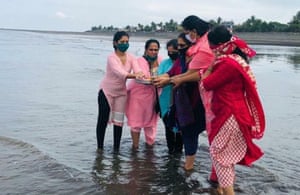
Our group Anam Prem (which means Anonymous Love) has been carrying out activities with local fishing communities. Commercial fishing has caused major shockwaves to traditional fishing communities in India. Most members of our group are based in Mumbai, which still houses traditional fishing communities in the midst of bustling trade and commerce.
On account of Covid-19, restrictions are in place for group gatherings. But on World Oceans Day our members living near the sea visited in small numbers and offered prayers, at the same time spreading awareness about the oceans and involving local fisher communities.
Isle of Skye, Scotland
Gill Williams, 58, underwater photographer
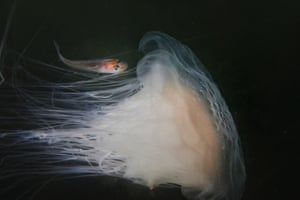
I spend almost every day in the waters around Skye, photographing what I see, good or bad. I spent World Oceans Day painting a picture of one of my images. For me, this peaceful kingdom needs protection from the human race who are doing so much damage to it. The oceans are the planet’s controlling factor: you lose the health of the oceans, you lose our planet.
I worry about the fish farms around the coast of Scotland. I was in the water only a few days ago and was immediately faced with a wall of green slurry as a result of practices at the nearby fish farm. We have a seal colony here. How are these creatures being affected by toxic waste and the underwater crow scarers going off all the time?
Ocho Rios, Jamaica
Richard Marsh, 59, retired scuba operation manager
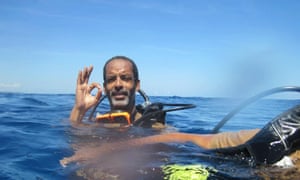
Jamaica was made from coral, it is what made the beaches, the white sand. The reefs are still damaged from Hurricane Allen in 1980. Algae-eating fish have been over-caught, there’s not many left, and the algae is overgrown. I am concerned about deforestation, a lot of which is caused by agriculture, especially young trees being cut down to make “yam sticks” (yams grow on a vine which is supported by the sticks). This causes the soil to erode and flow into the water, which kills the corals.
I grew up near the ocean and studied marine ecology before working in the scuba industry. I stopped diving after I had a car accident, but it would be depressing to go back to it now: there’s less fish, more algae, less coral, less life. I am about to start a land-based coral nursery in a tank to help rehabilitate the reef nearby, at the White River fish sanctuary. Is there a global movement to protect the oceans? I’d like to think so.
Okinawa, Japan
Kyoko Harukawa, 52, eco-tour guide and co-founder of Miyakojima Sea Environmental Network
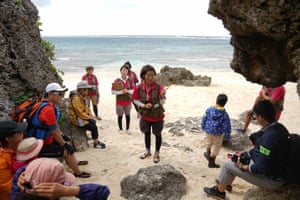
The amount of coastal garbage is terrible on the north-east coast of Miyako island, Okinawa. Most of the marine garbage here drifts from overseas from China, Korea, Taiwan or south-east Asian countries due to the Kuroshio current. Therefore, local people blame foreigners for “bad behaviour”.
However, in fact, local people are throwing a lot of rubbish into the sea and they don’t know this garbage flows to the Hawaiian Islands in the Pacific Ocean. As the sea has no borders, it connects people all over the world. Both treasures and trash flows along the coast. We organise marine observations on Ikema island or at a mangrove area to mark World Oceans Day each year to raise awareness.
Bergen, Norway
Marion Casey, 66, English teacher at Austevoll Vidaregaande Skule
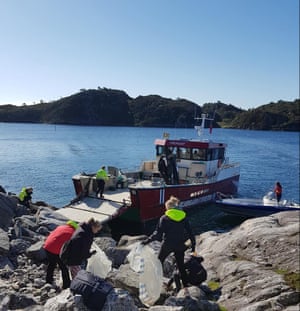
I work in a maritime school, an hour by catamaran ferry from Bergen. Most of the students are between 16 and 19 and the school trains them for work on fishing boats and supply boats. Some will eventually become captains and ship officers, others are doing qualifications to work on fish farms. For me the sea is a place to relax, a means of travelling round the country, and a way of earning a living for my students.
Usually on World Oceans Day the school borrows many small boats and the 140 or so students are distributed among them and each boat cleans a series of beaches and inlets. It is horrendous what we find. We couldn’t have the whole school out because of Covid-19 restrictions this year, but some students went out to clear rubbish from the little islands near our school.
Makarska, Croatia
Ana*, 30
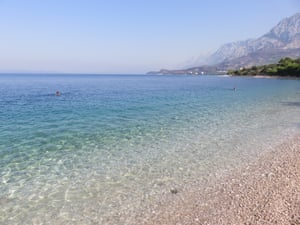
During the war years in 90s Croatia, the sea was a reliable source of nutritious food for my family and, equally important, a source of an awful lot of fun for us kids. I will always be thankful for that. There are fishermen in my family. I saw first-hand how sustainable fishing, with small wooden boats and rudimentary equipment, works. I grew up swimming and diving on Makarska Riviera and as a child I used to regularly see lots of fish, starfish, seahorses, seagrass, corals, crustaceans, sea cucumbers.
Unfortunately, there is nothing to see now. The extension of beach areas by throwing soil, building material and stones into coastal waters has been going on for years along the entire Dalmatian coast and has led to the disappearance of sea life in shallow underwater areas. It’s a treatment known as dohrana plaze (“feeding the beach”). I pity younger generations who most probably will never have the joy of enjoying the sea the way I did. Wherever I go, I always miss the Adriatic.
St John’s, Newfoundland and Labrador, Canada
Dennis Kimberley, 78, retired professor

I live on “iceberg alley”. I see first-hand the large increase in the loss of sea ice and what it means for humanity. I see first-hand the loss of polar bear habitat. I see the arrival of birds and sea animals that aren’t native to our environment. Very scary. We use the term “snowmageddon” to refer to the recent exceptionally dangerous and record-breaking snow falls. The ocean here is a source of life and employment, as well as of striking beauty. I celebrated it by visiting the ocean at the weekend and thanking my close fisher friends who fish sustainably.
San Jose, Costa Rica
Elke Sauter Ortiz, 32, geo-data specialist at Space4Good

Together with the Mothership team, we just finished the Big Blue Mission, a coding project dedicated to exploring the world’s coastal ecosystems and fragile ocean environments using satellite technologies and AI. Coder teams developed solutions for: spotting ocean sedimentation on coral reefs, developing a monitoring system to detect sand theft on beaches or dredging by boat, and improving flood prediction mapping.
Playa Samara, Costa Rica, is a second home for me and my family. Being able to bring groups of people together to contribute their coding skills to conserve to a space close to my heart is as rewarding of a job as it can get.
Maui, Hawaii
Lani*, 29, conservation coordinator
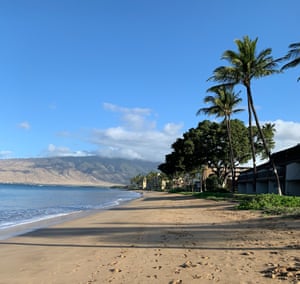
My biggest concern for environmental protection is the inequality in society. We can not effectively engage with global communities and ask for their help in this fight to save our planet when many wake up every day worrying about their basic human rights. I live in a place where the natural resources are exploited by visitors and left degraded and unusable for the native people of these islands. Subsistence fishing is their birthright; the degradation of the marine environment is a violation of this right.
On World Oceans Day my organisation took part in an in-water scuba clean of our reefs. The debris collected will be counted and catalogued. I also took part in a “dawn patrol”, which is a fancy way of saying I walked the beach really early in the morning to look for evidence of nesting turtles in an effort to ensure the safety of the nests and maximum return of turtles to the sea. It’s weird to see it so empty here on the island because of the lack of tourism right now.
Canoas, Brazil
Jose Truda Palazzo Jr, 56, marine conservation writer and consultant

I am deeply concerned that Brazil is abandoning its responsibility as steward of an immense area of the south Atlantic Ocean. Over the last few decades, and thanks mainly to civil society mobilisation, Brazil has taken an active role in ending whaling, supporting protection for endangered marine species, promoting the concept of a global agreement for biodiversity conservation beyond national jurisdiction and establishing several marine protected areas (MPAs).
The current government, unfortunately, has abandoned all these gains. It sees environmental issues as a “globalist plot” and has halted proper implementation and enforcement of our MPAs. The world needs to wake up to this as well as to the destruction of the Amazon. I celebrated World Oceans Day by continuing to raise hell for policymakers. I want my grandson to be able to enjoy a healthy, living ocean as part of his generation’s well-being and natural heritage.
Palmela, Portugal
Andre Amaro, 50, artist
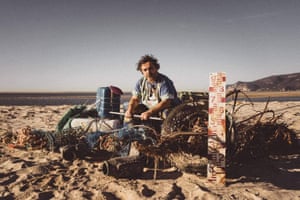
My art studio looks over Lisbon to the north and the mighty sandbanks of Troia to the south. I collect ocean plastics and make clothing, interiors and art pieces. My artwork is about the profound choice we as humanity make for comfortable living, with no regard to the Earth we live on. I collect the waste in Troia, and on the amazing beaches on the peninsula just south of Lisbon – their beauty is astonishing. On World Oceans Day I worked on a new art piece made from ocean plastics.
Zanzibar, Tanzania
Asma Hamad, 34, assistant biology lecturer at the State University of Zanzibar
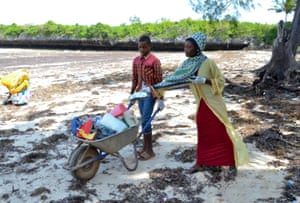
The major concern here is mangrove degradation – mangroves are targeted by local people for production of charcoal and firewood. Many people think of the consumptive value of mangrove, they are forgetting that there would be no fish or crabs without them. Mangroves protect us from strong waves, storms and erosion. We are vulnerable to the rise in sea level – the impact is already evident in many places of the island.
To me the ocean is an identity, you cannot talk about islanders’ life without touching on the role of the ocean. I volunteer with Zanzibar Volunteers for Environmental Conservation and we cleaned Uzi beach on Monday to mark World Oceans Day.
Newfoundland, Canada
Gerard Neil, 49, social enterprise manager
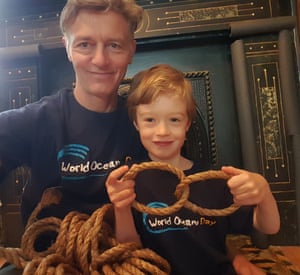
Our activism focuses on synthetic fishing rope used in industry. There are 75,000 people employed in fisheries in Canada and almost all use synthetic plastic rope, which breaks down to micro-particles and is the greatest pollutant in local waters. We advocate a return to natural fibre rope to greatly reduce ocean micro-plastics and to limit modern fishing methods and the weight that monster trawlers can pull (natural rope would break at those weights), promoting sustainable practices.
We hand tie and sell “wits” (rope formed into a circle, used to hold oars to boat thole-pins or to form the entrance to lobster pots), using the money to direct attention to our cause. On World Oceans Day we once again made an effort to focus attention to this cause.
*Names have been changed